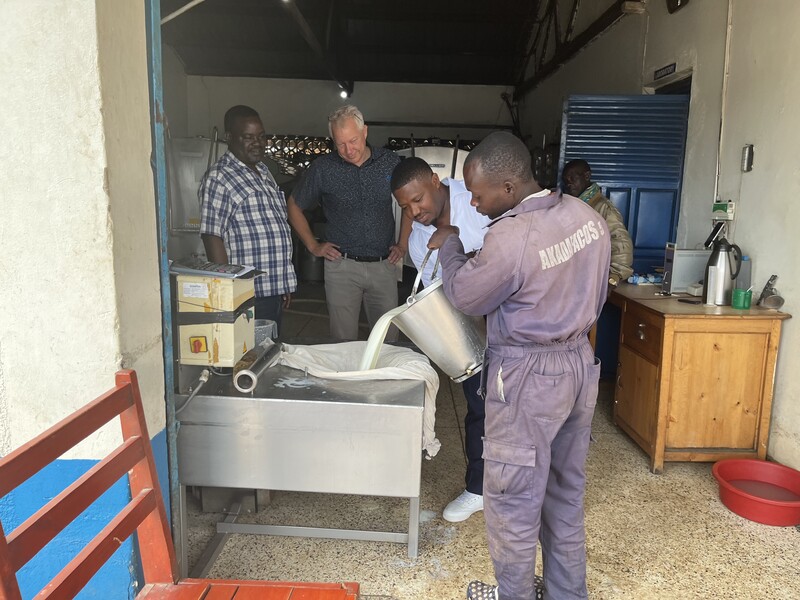FAO ramps up support to Uganda’s promising dairy sector on World Milk Day

Milk in your tea or coffee this morning? For many of us, milk is our daily dose of dairy alongside a cup of sweet tea or strong coffee. It’s no surprise then, that milk is one the most widely produced and valuable agricultural commodities on the planet. So much so that today, on World Milk Day (1 June), FAO and Uganda have announced a new collaboration to boost Ugandan milk exports, as part of a national drive to strengthen the domestic dairy sector and maximise its growth potential.
Today’s new country support for Uganda’s dairy sector comes at a time when the country’s estimated production of raw milk has ballooned from 1.9 billion litres in 2014 to 2.8 billion in 2021.
Despite that impressive growth, the dairy sector faces testing times ahead: supplies of raw milk suffer from strong seasonal fluctuations, processing capacity is underused, informal trade remains prevalent, quality issues limit international trade, and exports rely largely on demand from some key East Africa export markets, including neighbouring Kenya. Closer to home, household consumption of milk is low: Ugandans drink around 0.5 litre (550 millilitres) a day. This is two-thirds less than the dietary intake recommended by FAO and WHO, meaning Ugandans consume their recommended milk intake for about 2 out of the 7 days in a week.
Against this backdrop, the country’s Dairy Development Authority (DDA) embarked on an ambitious stakeholder engagement process to design a multi-year action plan – the Dairy Policy Action Plan. The Plan was adopted in August 2022 and sets out clear policy interventions and milestones over the next 5+ years to boost consumption, incentivise production, improve quality and tap into new markets.
One of the first areas to be tackled in the Dairy Policy Action Plan is the export potential and market competitiveness of Ugandan milk. This work, starting today and lasting until the autumn, is a cross divisional partnership between the Monitoring and Analysing Food and Agricultural Policies (MAFAP) programme in the Agrifood Economics Division (ESA) and AgrInvest of the FAO Investment Centre (sponsored by the European Union), together with FAO Uganda and the DDA. It will involve analysing Uganda’s dairy trade flows over recent years, assessing its comparative advantage, and identifying dairy products and foreign markets with high export potential.
In the run up to the Dairy Policy Action Plan, the MAFAP programme and AgrInvest supported DDA in organising several national and regional “policy dialogues” to engage with dairy sector stakeholders, take stock of existing challenges, identify priority interventions and investments, and come up with concrete policy recommendations.
To provide policy evidence for the dialogues, MAFAP’s team of economists and policy analysts had carried out a solid set of analyses to support the DDA: On price incentives for milk in Uganda, on milk collection centres, on post-harvest losses in the milk value chain, and on domestic milk consumption in Uganda. The analysis of milk price incentives, for instance, revealed that the prices fetched by milk farmers and traders were generally low, mainly due to a drop in international demand for Ugandan milk in recent years, a largely informal trade in milk and poorly integrated markets, as well as high marketing costs.
Nana Nkuingoua, Policy Analyst and MAFAP Focal Point in Uganda said: “Uganda has great potential to expand its milk industry and exports. To do that, understanding its international market competitiveness is crucial. An export-competitiveness study will provide important insights into the factors that impact Uganda's milk exports, including quality, price, non-tariff measures, as well as export opportunities and barriers in comparison to other milk-producing countries. The result will inform policy decisions to increase Ugandan milk exports, which are key for the growth of the milk industry, employment creation and improved household incomes”.
FAO has been at the heart of efforts to strengthen the dairy sector in Uganda, working in close collaboration with the DDA and the Ministry of Agriculture Animal Industry and Fisheries, and financed by the EU and FAO Investment Centre.
